13 feb 2018

The United States dismissed as false on Monday statements by Israel’s Prime Minister Benjamin Netanyahu that both parties were discussing the possibility of Israel annexing illegal settlements in the occupied West Bank, in another display of discord between U.S. President Donald Trump and Netanyahu.
“On the subject of applying sovereignty, I can say that I have been talking to the Americans about it for some time,” Netanyahu told a closed-door meeting of his right-wing Likud party’s legislators, according to the party’s spokesman.
Later on Monday, the White House denied having such discussions and a senior Israeli official said Netanyahu had not made a specific annexation proposal to Washington.
“Reports that the United States discussed with Israel an annexation plan for the West Bank are false,” White House spokesman Josh Raffel said.
“The United States and Israel have never discussed such a proposal.”
Issuing a clarification, the prime minister’s office stepped back from any suggestion of a dialogue with Washington on any government annexation plan. It said Netanyahu had only updated the Americans on proposed legislation in parliament.
The remarks stoked Palestinian anger, already high over Trump’s Dec. 6 announcement that the United States recognizes Jerusalem as Israel’s capital, a reversal of decades of U.S. policy.
“On the subject of applying sovereignty, I can say that I have been talking to the Americans about it for some time,” Netanyahu told a closed-door meeting of his right-wing Likud party’s legislators, according to the party’s spokesman.
Later on Monday, the White House denied having such discussions and a senior Israeli official said Netanyahu had not made a specific annexation proposal to Washington.
“Reports that the United States discussed with Israel an annexation plan for the West Bank are false,” White House spokesman Josh Raffel said.
“The United States and Israel have never discussed such a proposal.”
Issuing a clarification, the prime minister’s office stepped back from any suggestion of a dialogue with Washington on any government annexation plan. It said Netanyahu had only updated the Americans on proposed legislation in parliament.
The remarks stoked Palestinian anger, already high over Trump’s Dec. 6 announcement that the United States recognizes Jerusalem as Israel’s capital, a reversal of decades of U.S. policy.
12 feb 2018
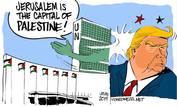
Since US President Donald Trump’s decision to recognise Jerusalem as Israel’s capital and the subsequent decision to cut American funding to UNRWA and the Palestinian Authority, the Palestinian leadership in Ramallah has announced formally and repeatedly that Washington cannot continue in its traditional role as the sole sponsor of the peace process.
Speaking shortly after Trump’s announcement in December, Mahmoud Abbas said that the Palestinians have been engaged with the President’s advisors to achieve the “deal of the century” but “instead we got the slap of our times”. He concluded that, “The United States has chosen to lose its qualification as a mediator… We will no longer accept that it has a role in the political process.”
At that point, the PA President suggested that the UN should take over as mediator. However, since then, the PA has been searching for an alternative to the US sponsorship which has been based on bringing together a wider group of influential countries to oversee negotiations between the Palestinians and the Israelis.
Israel has been silent on the matter, enjoying the complete US bias in its favour, whether from Trump’s advisors Jason Greenblatt and Jared Kushner, the US Ambassador to Israel David Freidman or the US Ambassador to the UN, Nikki Hayley.
During his recent visit to Israel, US Vice President Mike Pence received a hero’s welcome as he committed to moving the US Embassy from Tel Aviv to Jerusalem by the end of 2019. The Palestinians refused to meet him. Trump saw this as an act of disrespect to Pence and the US, and threatened the PA with further cuts in American aid unless they returned to the negotiating table.
The next port of call for the Palestinians for a sponsor of the peace talks was the European Union. Abbas visited the EU headquarters in Brussels recently and held talks with Federica Mogherini, the high representative for foreign affairs and security policy. If Abbas thought that the EU was ready to take a sole or significant role in the peace process, he was disappointed. Mogherini reiterated longstanding EU positions: “I want to, first of all, reassure President Abbas and his delegation of the firm commitment of the European Union to the two-state solution, with Jerusalem as the shared capital of the two states… based on the Oslo Accords and the international consensus embodied in the relevant UN Security Council resolutions.”
Mogherini also reaffirmed the EU’s opposition to the “settlement activity that we consider illegal under international law.” She reminded Abbas that the EU has “already invested a great deal in the Palestinian state-building project” and vowed that EU financial support would continue, “Including to UNRWA.” She did not respond to Abbas’s call for the EU as a bloc to recognise the State of Palestine.
In a press conference a few days later, before an extraordinary meeting of the International Donor Group for Palestine at the EU headquarters, Mogherini told reporters that any framework for negotiations must involve “all partners”, sending a strong message that the US could not be excluded: “Nothing without the United States, nothing with the United States alone.”
This must have come as a blow to the Palestinian leadership, which had hoped that the Americans could be sidelined from the peace process.
There are few alternatives for the Palestinians to pursue. France’s attempts to secure a greater role in the peace process resulted in the Paris Conference which took place in much more favourable conditions at the end of the Obama Administration, but it turned into a damp squib. The conference went ahead but little came out of it, and it has had no follow-up to speak of.
The Chinese, put forward their 4-point peace proposal last August:
-Advancing the two-state solution based on 1967 borders with East Jerusalem as the capital of a new Palestinian state.
-Upholding “the concept of common, comprehensive, cooperative and sustainable security,” immediately ending Israeli settlement building, taking immediate measures to prevent violence against civilians, and calling for an early resumption of peace talks.
-Coordinating international efforts to put forward “peace-promoting measures that entail joint participation at an early date.”
-Promoting peace through development and cooperation between the Palestinians and Israel.
While little has been heard of the proposal’s potential since last year, the Chinese stepped up their efforts to play a greater role in the peace process following Trump’s Jerusalem announcement. However, responding to a question about China’s possible future role at a regular press briefing on 21 December, Foreign Ministry spokesperson Hua Chunying said: “China’s position on the Palestine issue is consistent. We support and actively promote the Middle East peace process. We support the just cause of the Palestinian people to regain their legitimate national rights… We are willing to continue offering constructive assistance to promote the Israeli-Palestinian peace process.”
The Chinese hosted a symposium last December bringing together Palestinians and Israelis in a bid to break the impasse. The session culminated with the production of a non-binding position paper known as the “Beijing Initiative”, which Deputy Speaker of the Knesset and Zionist Union MK Hilk Bar said in a closing statement was intended to prove that “it is possible and necessary to break the political deadlock and encourage the two leaderships to return to the negotiating table.” A leading member of the Palestinian delegation added: “We have to search for another approach to the peace process… It must include the superpowers and China, maybe one of these parties who can play a major role.”
Attempts by Russia, another UN Security Council member to take a leading role in the peace process, go back many years but have not succeeded.
Palestinians have recently favoured an arrangement that mirrors the P5+1 which developed the Iran Nuclear Deal Agreement, which was concluded in 2015. The P5+1 refers to the 5 permanent members of the UN Security Council plus Germany. A similar arrangement could still see the US involved but not monopolising the framework for negotiations.
A possible starting point here could be the Quartet, known formally as the Middle East Quartet, which consists of the US, Russia, the EU and the UN. It describes its mandate as “to help mediate Middle East peace negotiations and to support Palestinian economic development and institution-building in preparation for eventual statehood.”
On the face of it, the Quartet, with an upgrade of its senior team, could be the readymade answer to the Palestinian demand for a downgrading of the US role rather than Washington being excluded altogether. That may go some way towards meeting Israel’s insistence that the US has to be an important player in any future set of negotiations.
The Saban Centre for Middle East Policy at Brookings evaluated the Quartet’s performance in 2012 in its paper “The Middle East Quartet: A post-Mortem“. It concluded that, but for some early successes up to 2003, the Quartet has not provided any tangible benefits, except “ensuring American engagement in the peace process.”
The Palestinians could request that certain countries are added to the group to provide their role with some prominence. These could include Japan, Egypt and China, and perhaps Britain as it leaves the EU. In other words a Q4+ format could be developed, possibly under UN leadership.
The advantage of the above arrangement, which will be challenging to bring together, is that the basic structure already exists. It is likely that the Palestinians would agree to such a grouping, leaving the US and Israel almost certainly rejecting it. However, this would show Palestinian flexibility and confirm US and Israel rejectionism.
There is a need for an alternative framework for negotiations to resolve the conflict other than the 25 years of futile talks led by the Americans whose bias towards Israel is guaranteed and blatant. The longer the void left by the Palestinian rejection of a role for the US exists, the longer that the status quo will continue, allowing Israel to march ahead with its colonial project. A revamped Quartet plus-plus is well worth serious consideration.
- Professor Kamel Hawwash is a British Palestinian engineering academic based at the University of Birmingham. He is a commentator on Middle East affairs, Vice Chair of the British Palestinian Policy Council (BPPC) and a member of the Executive Committee of the Palestine Solidarity Campaign (PSC). His article was published in MEMO.
Speaking shortly after Trump’s announcement in December, Mahmoud Abbas said that the Palestinians have been engaged with the President’s advisors to achieve the “deal of the century” but “instead we got the slap of our times”. He concluded that, “The United States has chosen to lose its qualification as a mediator… We will no longer accept that it has a role in the political process.”
At that point, the PA President suggested that the UN should take over as mediator. However, since then, the PA has been searching for an alternative to the US sponsorship which has been based on bringing together a wider group of influential countries to oversee negotiations between the Palestinians and the Israelis.
Israel has been silent on the matter, enjoying the complete US bias in its favour, whether from Trump’s advisors Jason Greenblatt and Jared Kushner, the US Ambassador to Israel David Freidman or the US Ambassador to the UN, Nikki Hayley.
During his recent visit to Israel, US Vice President Mike Pence received a hero’s welcome as he committed to moving the US Embassy from Tel Aviv to Jerusalem by the end of 2019. The Palestinians refused to meet him. Trump saw this as an act of disrespect to Pence and the US, and threatened the PA with further cuts in American aid unless they returned to the negotiating table.
The next port of call for the Palestinians for a sponsor of the peace talks was the European Union. Abbas visited the EU headquarters in Brussels recently and held talks with Federica Mogherini, the high representative for foreign affairs and security policy. If Abbas thought that the EU was ready to take a sole or significant role in the peace process, he was disappointed. Mogherini reiterated longstanding EU positions: “I want to, first of all, reassure President Abbas and his delegation of the firm commitment of the European Union to the two-state solution, with Jerusalem as the shared capital of the two states… based on the Oslo Accords and the international consensus embodied in the relevant UN Security Council resolutions.”
Mogherini also reaffirmed the EU’s opposition to the “settlement activity that we consider illegal under international law.” She reminded Abbas that the EU has “already invested a great deal in the Palestinian state-building project” and vowed that EU financial support would continue, “Including to UNRWA.” She did not respond to Abbas’s call for the EU as a bloc to recognise the State of Palestine.
In a press conference a few days later, before an extraordinary meeting of the International Donor Group for Palestine at the EU headquarters, Mogherini told reporters that any framework for negotiations must involve “all partners”, sending a strong message that the US could not be excluded: “Nothing without the United States, nothing with the United States alone.”
This must have come as a blow to the Palestinian leadership, which had hoped that the Americans could be sidelined from the peace process.
There are few alternatives for the Palestinians to pursue. France’s attempts to secure a greater role in the peace process resulted in the Paris Conference which took place in much more favourable conditions at the end of the Obama Administration, but it turned into a damp squib. The conference went ahead but little came out of it, and it has had no follow-up to speak of.
The Chinese, put forward their 4-point peace proposal last August:
-Advancing the two-state solution based on 1967 borders with East Jerusalem as the capital of a new Palestinian state.
-Upholding “the concept of common, comprehensive, cooperative and sustainable security,” immediately ending Israeli settlement building, taking immediate measures to prevent violence against civilians, and calling for an early resumption of peace talks.
-Coordinating international efforts to put forward “peace-promoting measures that entail joint participation at an early date.”
-Promoting peace through development and cooperation between the Palestinians and Israel.
While little has been heard of the proposal’s potential since last year, the Chinese stepped up their efforts to play a greater role in the peace process following Trump’s Jerusalem announcement. However, responding to a question about China’s possible future role at a regular press briefing on 21 December, Foreign Ministry spokesperson Hua Chunying said: “China’s position on the Palestine issue is consistent. We support and actively promote the Middle East peace process. We support the just cause of the Palestinian people to regain their legitimate national rights… We are willing to continue offering constructive assistance to promote the Israeli-Palestinian peace process.”
The Chinese hosted a symposium last December bringing together Palestinians and Israelis in a bid to break the impasse. The session culminated with the production of a non-binding position paper known as the “Beijing Initiative”, which Deputy Speaker of the Knesset and Zionist Union MK Hilk Bar said in a closing statement was intended to prove that “it is possible and necessary to break the political deadlock and encourage the two leaderships to return to the negotiating table.” A leading member of the Palestinian delegation added: “We have to search for another approach to the peace process… It must include the superpowers and China, maybe one of these parties who can play a major role.”
Attempts by Russia, another UN Security Council member to take a leading role in the peace process, go back many years but have not succeeded.
Palestinians have recently favoured an arrangement that mirrors the P5+1 which developed the Iran Nuclear Deal Agreement, which was concluded in 2015. The P5+1 refers to the 5 permanent members of the UN Security Council plus Germany. A similar arrangement could still see the US involved but not monopolising the framework for negotiations.
A possible starting point here could be the Quartet, known formally as the Middle East Quartet, which consists of the US, Russia, the EU and the UN. It describes its mandate as “to help mediate Middle East peace negotiations and to support Palestinian economic development and institution-building in preparation for eventual statehood.”
On the face of it, the Quartet, with an upgrade of its senior team, could be the readymade answer to the Palestinian demand for a downgrading of the US role rather than Washington being excluded altogether. That may go some way towards meeting Israel’s insistence that the US has to be an important player in any future set of negotiations.
The Saban Centre for Middle East Policy at Brookings evaluated the Quartet’s performance in 2012 in its paper “The Middle East Quartet: A post-Mortem“. It concluded that, but for some early successes up to 2003, the Quartet has not provided any tangible benefits, except “ensuring American engagement in the peace process.”
The Palestinians could request that certain countries are added to the group to provide their role with some prominence. These could include Japan, Egypt and China, and perhaps Britain as it leaves the EU. In other words a Q4+ format could be developed, possibly under UN leadership.
The advantage of the above arrangement, which will be challenging to bring together, is that the basic structure already exists. It is likely that the Palestinians would agree to such a grouping, leaving the US and Israel almost certainly rejecting it. However, this would show Palestinian flexibility and confirm US and Israel rejectionism.
There is a need for an alternative framework for negotiations to resolve the conflict other than the 25 years of futile talks led by the Americans whose bias towards Israel is guaranteed and blatant. The longer the void left by the Palestinian rejection of a role for the US exists, the longer that the status quo will continue, allowing Israel to march ahead with its colonial project. A revamped Quartet plus-plus is well worth serious consideration.
- Professor Kamel Hawwash is a British Palestinian engineering academic based at the University of Birmingham. He is a commentator on Middle East affairs, Vice Chair of the British Palestinian Policy Council (BPPC) and a member of the Executive Committee of the Palestine Solidarity Campaign (PSC). His article was published in MEMO.
11 feb 2018

Washington has declared its full support for any Israeli military escalation against Syria, describing Israel (an occupying power) as a country that has the right to defend itself.
A statement from the White House press secretary on Sunday said that “Israel is a staunch ally of the United States, and we support its right to defend itself from the Iranian-backed Syrian and militia forces in southern Syria.”
A similar position was also voiced on Saturday by state department spokeswoman Heather Nauert, who also said that “Iran’s calculated escalation of threat and its ambition to project its power and dominance place all the people of the region, from Yemen to Lebanon, at risk.”
“The US continues to push back on the totality of Iran’s malign activities in the region and calls for an end to Iranian behavior that threatens peace and stability,” she added.
The US department of defense (the Pentagon) also claimed yesterday that Israel was entitled to protect itself against acts of aggression.
“Israel is our closest security partner in the region and we fully support Israel’s inherent right to defend itself against threats to its territory and its people,” Pentagon spokesman Adrian Rankine said.
Such remarks follow Israel’s aerial bombing of several targets in Syria on Saturday, which was claimed to be in response to anti-aircraft fire that downed one of its warplanes as it was returning from an attack on alleged Iranian-backed positions in Syria.
Earlier, Israel justified its raids on those positions in Syria by saying they were carried out after an Iranian drone had entered its (occupied) territory late Friday and later was shot down by its air forces.
A statement from the White House press secretary on Sunday said that “Israel is a staunch ally of the United States, and we support its right to defend itself from the Iranian-backed Syrian and militia forces in southern Syria.”
A similar position was also voiced on Saturday by state department spokeswoman Heather Nauert, who also said that “Iran’s calculated escalation of threat and its ambition to project its power and dominance place all the people of the region, from Yemen to Lebanon, at risk.”
“The US continues to push back on the totality of Iran’s malign activities in the region and calls for an end to Iranian behavior that threatens peace and stability,” she added.
The US department of defense (the Pentagon) also claimed yesterday that Israel was entitled to protect itself against acts of aggression.
“Israel is our closest security partner in the region and we fully support Israel’s inherent right to defend itself against threats to its territory and its people,” Pentagon spokesman Adrian Rankine said.
Such remarks follow Israel’s aerial bombing of several targets in Syria on Saturday, which was claimed to be in response to anti-aircraft fire that downed one of its warplanes as it was returning from an attack on alleged Iranian-backed positions in Syria.
Earlier, Israel justified its raids on those positions in Syria by saying they were carried out after an Iranian drone had entered its (occupied) territory late Friday and later was shot down by its air forces.
10 feb 2018
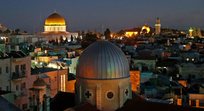
Arab parliamentarians called, on Saturday, for severing ties with any country that recognizes Jerusalem as the capital of Israel or transfers its embassy to the occupied city.
At the end of their third annual conference held in Cairo, heads of Arab parliaments urged the Arab summit, scheduled to be held in Saudi Arabia, in March, to sever all relations with countries that recognize Jerusalem as the capital of Israel.
They also stressed, according to WAFA, support of the Palestinian leadership and the decisions it has taken to counter the US recognition of Jerusalem as Israel’s capital, urging for backing the Palestinian leadership at all levels, through Arab financial and political support.
The presidents of the Arab parliaments stressed their rejection of US President Donald Trump’s decision on Jerusalem and its consequences, stressing that such a decision violates international law.
The parliamentarians said that the US administration cannot be a fair sponsor and broker for the peace process after this unjust decision, adding that the US move was faced by an international rejection.
They also stressed rejection of US administration policy aimed at proposing projects or ideas related to the Palestinian issue that are outside the rules of international law and the United Nations resolutions, asserting that the US is trying to impose a solution that does not meet the minimum rights of the Palestinian people.
12/24/17 Prince Salman Warns Abbas to Support US ‘Peace Plan’ or Be Ousted
At the end of their third annual conference held in Cairo, heads of Arab parliaments urged the Arab summit, scheduled to be held in Saudi Arabia, in March, to sever all relations with countries that recognize Jerusalem as the capital of Israel.
They also stressed, according to WAFA, support of the Palestinian leadership and the decisions it has taken to counter the US recognition of Jerusalem as Israel’s capital, urging for backing the Palestinian leadership at all levels, through Arab financial and political support.
The presidents of the Arab parliaments stressed their rejection of US President Donald Trump’s decision on Jerusalem and its consequences, stressing that such a decision violates international law.
The parliamentarians said that the US administration cannot be a fair sponsor and broker for the peace process after this unjust decision, adding that the US move was faced by an international rejection.
They also stressed rejection of US administration policy aimed at proposing projects or ideas related to the Palestinian issue that are outside the rules of international law and the United Nations resolutions, asserting that the US is trying to impose a solution that does not meet the minimum rights of the Palestinian people.
12/24/17 Prince Salman Warns Abbas to Support US ‘Peace Plan’ or Be Ousted
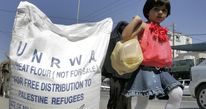
More than 100 US Congress members from the Democratic Party have urged US President Donald Trump to resume contributions to the United Nations Relief Works Agency for Palestine Refugees in the Near East (UNRWA).
"We write to urge you to continue vital US contributions to… UNRWA and bilateral assistance to the Palestinians. Continuing to freeze this aid will harm American interests by exacerbating the threats facing both peoples and reducing the United States' ability to help the Israelis and Palestinians reach a two-state solution," the letter issued on Thursday read, Sputnik reported.
The news comes amid Washington's decision to withhold $65 million out of $125-million contribution to the agency. The step was taken after the Palestinian leaders had refused to accept any peace plans proposed by the United States as a result of the recognition of the city of Jerusalem as the capital of Israel.
UNRWA Commissioner-General Pierre Krahenbuhl said he would request other donor nations to contribute and start “a global fundraising campaign” aimed at keeping the agency’s schools and clinics for refugees open through 2018.
The UNRWA has been providing aid to the Palestinian refugees in Lebanon, Jordan and Syria, who were forced to flee their homes since 1949. The aid includes education, health care and social services. Most of the organization's funding has been ensured by the European countries and the United States.
"We write to urge you to continue vital US contributions to… UNRWA and bilateral assistance to the Palestinians. Continuing to freeze this aid will harm American interests by exacerbating the threats facing both peoples and reducing the United States' ability to help the Israelis and Palestinians reach a two-state solution," the letter issued on Thursday read, Sputnik reported.
The news comes amid Washington's decision to withhold $65 million out of $125-million contribution to the agency. The step was taken after the Palestinian leaders had refused to accept any peace plans proposed by the United States as a result of the recognition of the city of Jerusalem as the capital of Israel.
UNRWA Commissioner-General Pierre Krahenbuhl said he would request other donor nations to contribute and start “a global fundraising campaign” aimed at keeping the agency’s schools and clinics for refugees open through 2018.
The UNRWA has been providing aid to the Palestinian refugees in Lebanon, Jordan and Syria, who were forced to flee their homes since 1949. The aid includes education, health care and social services. Most of the organization's funding has been ensured by the European countries and the United States.
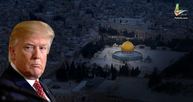
Speaking to Israel Hayom paper, US President Donald Trump considered his recognition of Jerusalem as Israel’s capital as one of the highlights of his presidency thus far.
Israel Hayom, a daily that largely backs Israeli Prime Minister Benjamin Netanyahu, carried some quotes Friday from an interview with Trump to be published next week.
When asked to name the most memorable event of his presidency, it quotes Trump as saying "I think Jerusalem was a very big point. And I think it was a very important point. The capital, having Jerusalem be your great capital, was a very important thing to a lot of people."
On Dec. 6, Trump decided to recognize Jerusalem as Israel's capital and vowed to relocate the U.S. Embassy to the city.
The decision has generated a series of angry reactions in Palestine and around the world as it ended all hopes that the long-moribund peace process might lead to an independent Palestinian state.
Israel Hayom, a daily that largely backs Israeli Prime Minister Benjamin Netanyahu, carried some quotes Friday from an interview with Trump to be published next week.
When asked to name the most memorable event of his presidency, it quotes Trump as saying "I think Jerusalem was a very big point. And I think it was a very important point. The capital, having Jerusalem be your great capital, was a very important thing to a lot of people."
On Dec. 6, Trump decided to recognize Jerusalem as Israel's capital and vowed to relocate the U.S. Embassy to the city.
The decision has generated a series of angry reactions in Palestine and around the world as it ended all hopes that the long-moribund peace process might lead to an independent Palestinian state.
8 feb 2018
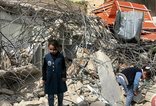
Some 44 Jewish settlers escorted by 33 American soldiers on Thursday broke into al-Aqsa Mosque's plazas amid protection by Israeli police.
Islamic Endowment Department in Jerusalem, said that the American soldiers stormed the holy site in civilian uniform with the company of an Israeli officer.
The incursion was made through the Israeli-controlled al-Magharebah gate and was concluded by several tours in the courtyards of the holy shrine before exiting the mosque from al-Silsilah gate.
Islamic Endowment Department in Jerusalem, said that the American soldiers stormed the holy site in civilian uniform with the company of an Israeli officer.
The incursion was made through the Israeli-controlled al-Magharebah gate and was concluded by several tours in the courtyards of the holy shrine before exiting the mosque from al-Silsilah gate.
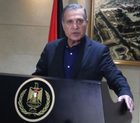
Responding to statement by U.S. Ambassador David Friedman, the official Palestinian Presidency spokesperson, Nabil Abu Rodeina, said Tuesday that the ongoing illegal Israeli occupation of Palestine is the root cause of all violence in the region, and denounced the American stances that destroy all chances of real peace.
Abu Rodeina stated that Israel’s insistence on keeping its illegal occupation, violations and apartheid colonialist policies, are the root cause of all violence in the entire region.
He added that the only way to end the conflict and achieve peace in the region is to end the ongoing illegal Israeli occupation of Palestine, by implementing all related United Nations and Security Council resolutions that call for ending this and establishing an independent Palestinian state.
His statements came in response to the American Ambassador to Israel David M. Friedman, who accused the Palestinian leadership of praising attacks against Israel, including the latest stabbing Itamar illegal Israeli colony, in the occupied West Bank.
Abu Rodeina said that, instead of trying to create a positive atmosphere that could enable the resumption of real peace talks, Friedman is seeking further tension, and is attempting to bring more violence to the region.
“Such statements are unbecoming of an Ambassador; they are complete flawed and aim at creating more tension,” he said, “The Palestinian leadership supports nonviolent resistance against the Israeli occupation, and never condones violence of any type. Friedman’s statements only lead to more harm and violence to the region.”
The Palestinian official also stated that real and comprehensive peace requires the full Israeli withdrawal from the occupied territories, the establishment of a viable, contagious Palestinian State, with East Jerusalem as its capital, by implementing all related international resolutions.
Abu Rodeina stated that Israel’s insistence on keeping its illegal occupation, violations and apartheid colonialist policies, are the root cause of all violence in the entire region.
He added that the only way to end the conflict and achieve peace in the region is to end the ongoing illegal Israeli occupation of Palestine, by implementing all related United Nations and Security Council resolutions that call for ending this and establishing an independent Palestinian state.
His statements came in response to the American Ambassador to Israel David M. Friedman, who accused the Palestinian leadership of praising attacks against Israel, including the latest stabbing Itamar illegal Israeli colony, in the occupied West Bank.
Abu Rodeina said that, instead of trying to create a positive atmosphere that could enable the resumption of real peace talks, Friedman is seeking further tension, and is attempting to bring more violence to the region.
“Such statements are unbecoming of an Ambassador; they are complete flawed and aim at creating more tension,” he said, “The Palestinian leadership supports nonviolent resistance against the Israeli occupation, and never condones violence of any type. Friedman’s statements only lead to more harm and violence to the region.”
The Palestinian official also stated that real and comprehensive peace requires the full Israeli withdrawal from the occupied territories, the establishment of a viable, contagious Palestinian State, with East Jerusalem as its capital, by implementing all related international resolutions.
2 feb 2018
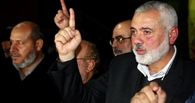
The Spokesperson of the Turkish Ministry of Foreign Affairs, Hami Aksoy, said that his country is concerned over the decision of the US Administration that blacklisted Head of Hamas Movement, Ismail Haneeya, as a "global terrorist".
"The US decision which disregards the realities on the ground could undermine the Middle East Peace Process, including the efforts for intra-Palestinian peace and reconciliation", he said
"We also hope that the decision will not have a negative impact on our country’s humanitarian assistance and economic development activities towards Gaza", he added.
"It is obvious that this decision, which overlooks the fact that Hamas is an important reality of Palestinian political life, cannot make any contribution to the just, comprehensive and lasting settlement of the Israeli-Palestinian conflict", Aksoy said.
The US State Department issued a press release on Wednesday blacklisting Haneyya as a "global terrorist".
"The US decision which disregards the realities on the ground could undermine the Middle East Peace Process, including the efforts for intra-Palestinian peace and reconciliation", he said
"We also hope that the decision will not have a negative impact on our country’s humanitarian assistance and economic development activities towards Gaza", he added.
"It is obvious that this decision, which overlooks the fact that Hamas is an important reality of Palestinian political life, cannot make any contribution to the just, comprehensive and lasting settlement of the Israeli-Palestinian conflict", Aksoy said.
The US State Department issued a press release on Wednesday blacklisting Haneyya as a "global terrorist".
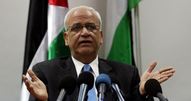
The Palestine Liberation Organization (PLO) has repudiated the US state department’s decision to put head of Hamas’s political bureau Ismail Haneyya on its list of global terrorists.
In a press release on Thursday, PLO secretary-general Saeb Erekat said that the organization rejects and condemns the American decision against Haneyya.
Erekat called for the rift between Fatah and Hamas to be healed in order to achieve the national unity, preserve the Palestinian national project and confront the schemes aimed at liquidating the Palestinian cause.
Haneyya, 54, was elected to be the group's political chief in May 2017, replacing Khaled Mishaal.
Born in a refugee camp in Gaza, the leader has long been seen as pragmatic and flexible in his political positions.
Hamas, which governs the beleaguered Gaza Strip, was founded in 1987 on a strategy of armed struggle against the Israeli occupation, and has a military wing known as the Izz al-Din al-Qassam Brigades.
In a press release on Thursday, PLO secretary-general Saeb Erekat said that the organization rejects and condemns the American decision against Haneyya.
Erekat called for the rift between Fatah and Hamas to be healed in order to achieve the national unity, preserve the Palestinian national project and confront the schemes aimed at liquidating the Palestinian cause.
Haneyya, 54, was elected to be the group's political chief in May 2017, replacing Khaled Mishaal.
Born in a refugee camp in Gaza, the leader has long been seen as pragmatic and flexible in his political positions.
Hamas, which governs the beleaguered Gaza Strip, was founded in 1987 on a strategy of armed struggle against the Israeli occupation, and has a military wing known as the Izz al-Din al-Qassam Brigades.
1 feb 2018

The United States has designated Haneyya, the senior political leader of Hamas resistance movement, as a "global terrorist".
The US State Department issued a press release on Wednesday saying that Haneyya "has close links with Hamas' military wing" and "has been a proponent of armed struggle".
Haneyya’s placement on the "terror list" means that there will be a travel ban on him, and that any US-based financial assets he may have will be frozen.
There will also be a ban on any US citizen or company from doing business with him.
"These designations target key terrorist groups and leaders - including two sponsored and directed by Iran - who are threatening the stability of the Middle East, undermining the peace process, and attacking our allies Egypt and Israel," claimed the US Secretary of State Rex Tillerson.
Hamas, which is headquartered in the Israeli-blockaded Gaza Strip, was founded in 1987 on a strategy of armed struggle against the occupation, and has a military wing known as the Izz al-Din al-Qassam Brigades.
Haneyya, 54, was elected to be the group's political chief in May 2017, replacing Khaled Meshaal. Born in a refugee camp in Gaza, the leader has long been seen as pragmatic and flexible in his attitudes.
Hamas movement condemned the US decision as part of a wider ad hominem campaign against the Palestinians since President Donald Trump came into office in January 2017- one year ago.
The animosity shown by the US administration towards the Palestinians has reached unprecedented levels, with its unconditional support of Israel and its decision surrounding Jerusalem, and cutting its funding to the UN refugee agency (UNRWA).
Trump has made a series of decisions in recent months that have increased tensions in the region.
In a major break with decades of US policy, Trump announced on December 6 that the US formally recognizes Occupied Jerusalem as the capital of Israel, and will begin the process of moving its embassy from Tel Aviv to the holy city. The move unleashed protests across the occupied Palestinian territories and in major cities around the world.
And, on January 17, the US government decided to cut more than half of its planned funding to the UN aid agency for Palestinian refugees - an institution that has been the lifeline to more than five million registered Palestinian refugees for over 70 years.
To thousands across the occupied Palestinian territories and the world, Haneyya stands as an icon of anti-occupation resistance.
The US State Department issued a press release on Wednesday saying that Haneyya "has close links with Hamas' military wing" and "has been a proponent of armed struggle".
Haneyya’s placement on the "terror list" means that there will be a travel ban on him, and that any US-based financial assets he may have will be frozen.
There will also be a ban on any US citizen or company from doing business with him.
"These designations target key terrorist groups and leaders - including two sponsored and directed by Iran - who are threatening the stability of the Middle East, undermining the peace process, and attacking our allies Egypt and Israel," claimed the US Secretary of State Rex Tillerson.
Hamas, which is headquartered in the Israeli-blockaded Gaza Strip, was founded in 1987 on a strategy of armed struggle against the occupation, and has a military wing known as the Izz al-Din al-Qassam Brigades.
Haneyya, 54, was elected to be the group's political chief in May 2017, replacing Khaled Meshaal. Born in a refugee camp in Gaza, the leader has long been seen as pragmatic and flexible in his attitudes.
Hamas movement condemned the US decision as part of a wider ad hominem campaign against the Palestinians since President Donald Trump came into office in January 2017- one year ago.
The animosity shown by the US administration towards the Palestinians has reached unprecedented levels, with its unconditional support of Israel and its decision surrounding Jerusalem, and cutting its funding to the UN refugee agency (UNRWA).
Trump has made a series of decisions in recent months that have increased tensions in the region.
In a major break with decades of US policy, Trump announced on December 6 that the US formally recognizes Occupied Jerusalem as the capital of Israel, and will begin the process of moving its embassy from Tel Aviv to the holy city. The move unleashed protests across the occupied Palestinian territories and in major cities around the world.
And, on January 17, the US government decided to cut more than half of its planned funding to the UN aid agency for Palestinian refugees - an institution that has been the lifeline to more than five million registered Palestinian refugees for over 70 years.
To thousands across the occupied Palestinian territories and the world, Haneyya stands as an icon of anti-occupation resistance.
31 jan 2018
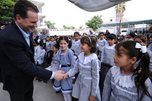
US administration has proposed that the UNRWA changes its school textbooks in order to continue to receive US donations, Jordanian newspaper Al-Ghad reported, on Tuesday.
The newspaper said that the US proposed two amendments to the textbooks, which include the abolition of all references to the right of return and issue of refugees in general, as well having no mention of Jerusalem as the capital of Palestine.
Al-Ghad said that the other proposed condition, which would guarantee the continuation of US aid to the UN body only in occupied Palestinian territories and Jordan, is to stop commemorating occasions such as Nakba Day and the Balfour Declaration.
Meanwhile, the UNRWA’s Chief of Communications, Sami Msha’sha’, said that the US had conditioned the continuation of aid to the organization after carrying out the “amendments”, and said it would only fund UNRWA’s operations in Jordan and the occupied territories.
He reiterated that the UNRWA is suffering from an “unprecedented” budget crisis, but stressed that it would continue offering its services to Palestinian refugees in besieged Gaza, the occupied West Bank, Jordan, Lebanon and Syria.
The newspaper said that the US proposed two amendments to the textbooks, which include the abolition of all references to the right of return and issue of refugees in general, as well having no mention of Jerusalem as the capital of Palestine.
Al-Ghad said that the other proposed condition, which would guarantee the continuation of US aid to the UN body only in occupied Palestinian territories and Jordan, is to stop commemorating occasions such as Nakba Day and the Balfour Declaration.
Meanwhile, the UNRWA’s Chief of Communications, Sami Msha’sha’, said that the US had conditioned the continuation of aid to the organization after carrying out the “amendments”, and said it would only fund UNRWA’s operations in Jordan and the occupied territories.
He reiterated that the UNRWA is suffering from an “unprecedented” budget crisis, but stressed that it would continue offering its services to Palestinian refugees in besieged Gaza, the occupied West Bank, Jordan, Lebanon and Syria.
27 jan 2018

Slovenian President Borut Pahor has announced that his country will not recognize the Palestinian state at this stage, claiming that such move would aggravate the Palestinian-Israeli conflict.
This decision followed a statement by Slovenia's foreign minister, Karl Erjavec, last Monday that his country is in the process of recognizing the state of Palestine. However, the president later said that the right moment for the recognition has not come yet.
Following his meeting with the Palestinian Authority president, Mahmoud Abbas, in Brussels, Erjavec said that the Slovenian government plans to recognize the Palestinian state next Spring.
The parliament's foreign affairs committee is scheduled to meet on Wednesday to approve the proposal and submit it to the parliament for a vote in March or April 2018, according to Slovenia's RTV channel.
Slovenia's ambassador to Israel, Barbara Sušnik, on Monday told Agence France-Presse that the US president Donald Trump's recent decision to recognize Jerusalem as the capital of Israel was one of the reasons that prompted Ljubljana to accelerate its plan to recognize the Palestinian state which was first put forward in 2014.
Of the 28 European Union (EU) countries, only nine recognize the state of Palestine. Sweden is the only country to recognize Palestine while it is a member of the EU. The rest of the Czech Republic, Slovakia, Hungary, Poland, Bulgaria, Romania, Malta and Cyprus made this move before becoming EU members.
It is clear that Slovenia has backtracked on the recognition move in response to a US-Israeli request in order to pressure the Palestinians to accept Washington's "deal of the century".
This decision followed a statement by Slovenia's foreign minister, Karl Erjavec, last Monday that his country is in the process of recognizing the state of Palestine. However, the president later said that the right moment for the recognition has not come yet.
Following his meeting with the Palestinian Authority president, Mahmoud Abbas, in Brussels, Erjavec said that the Slovenian government plans to recognize the Palestinian state next Spring.
The parliament's foreign affairs committee is scheduled to meet on Wednesday to approve the proposal and submit it to the parliament for a vote in March or April 2018, according to Slovenia's RTV channel.
Slovenia's ambassador to Israel, Barbara Sušnik, on Monday told Agence France-Presse that the US president Donald Trump's recent decision to recognize Jerusalem as the capital of Israel was one of the reasons that prompted Ljubljana to accelerate its plan to recognize the Palestinian state which was first put forward in 2014.
Of the 28 European Union (EU) countries, only nine recognize the state of Palestine. Sweden is the only country to recognize Palestine while it is a member of the EU. The rest of the Czech Republic, Slovakia, Hungary, Poland, Bulgaria, Romania, Malta and Cyprus made this move before becoming EU members.
It is clear that Slovenia has backtracked on the recognition move in response to a US-Israeli request in order to pressure the Palestinians to accept Washington's "deal of the century".
